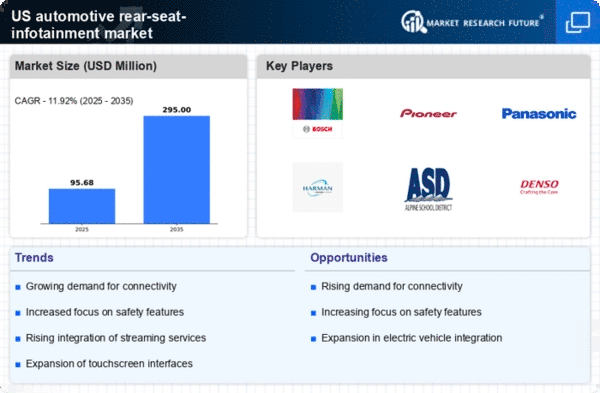Growing Demand for In-Vehicle Entertainment
The automotive rear-seat-infotainment market experiences a notable surge in demand for in-vehicle entertainment systems. As families and passengers seek enhanced travel experiences, the integration of high-definition screens, gaming consoles, and streaming services becomes increasingly prevalent. Recent data indicates that the market is projected to grow at a CAGR of approximately 15% over the next five years. This growth is driven by consumer preferences for engaging content during long journeys, leading manufacturers to innovate and expand their infotainment offerings. The automotive rear-seat-infotainment market is thus positioned to capitalize on this trend, as automakers strive to meet the expectations of tech-savvy consumers who prioritize entertainment options in their vehicles.
Increasing Focus on Safety and Connectivity
The automotive rear-seat-infotainment market is increasingly influenced by a growing focus on safety and connectivity features. As regulations surrounding vehicle safety become more stringent, manufacturers are integrating infotainment systems that promote safe driving practices. Features such as rear-seat monitoring and emergency communication systems are becoming standard. Furthermore, the rise of connected vehicles allows for real-time updates and remote access to infotainment systems, enhancing user convenience. This trend suggests that the automotive rear-seat-infotainment market will continue to evolve, as safety and connectivity become paramount in consumer decision-making processes.
Rising Consumer Expectations for Customization
Consumer expectations for customization are significantly impacting the automotive rear-seat-infotainment market. As individuals seek personalized experiences, manufacturers are responding by offering customizable infotainment solutions that cater to diverse preferences. This includes options for tailored content, user interfaces, and even the ability to sync personal devices seamlessly. Market Research Future indicates that approximately 60% of consumers express a desire for personalized entertainment options in their vehicles. Consequently, the automotive rear-seat-infotainment market is adapting to these demands, fostering innovation and competition among manufacturers to deliver unique and engaging experiences for passengers.
Expansion of Ride-Sharing and Mobility Services
The expansion of ride-sharing and mobility services is reshaping the automotive rear-seat-infotainment market. As more consumers opt for shared transportation solutions, the need for engaging infotainment systems in vehicles used for ride-sharing becomes apparent. Companies are increasingly equipping their fleets with advanced rear-seat infotainment options to enhance passenger satisfaction and retention. This trend is expected to drive growth in the market, as ride-sharing services aim to differentiate themselves through superior in-vehicle experiences. The automotive rear-seat-infotainment market is thus likely to see increased investment and innovation in this area, catering to the evolving landscape of urban mobility.
Technological Advancements in Display and Audio Systems
Technological advancements play a crucial role in shaping the automotive rear-seat-infotainment market. Innovations in display technology, such as OLED and 4K resolution screens, enhance visual experiences for rear-seat passengers. Additionally, improvements in audio systems, including surround sound and noise-cancellation features, contribute to a more immersive environment. The market is witnessing a shift towards integrating artificial intelligence and voice recognition capabilities, allowing for seamless interaction with infotainment systems. As a result, the automotive rear-seat-infotainment market is likely to benefit from these advancements, as they not only elevate user experience but also attract consumers looking for cutting-edge technology in their vehicles.


















Leave a Comment